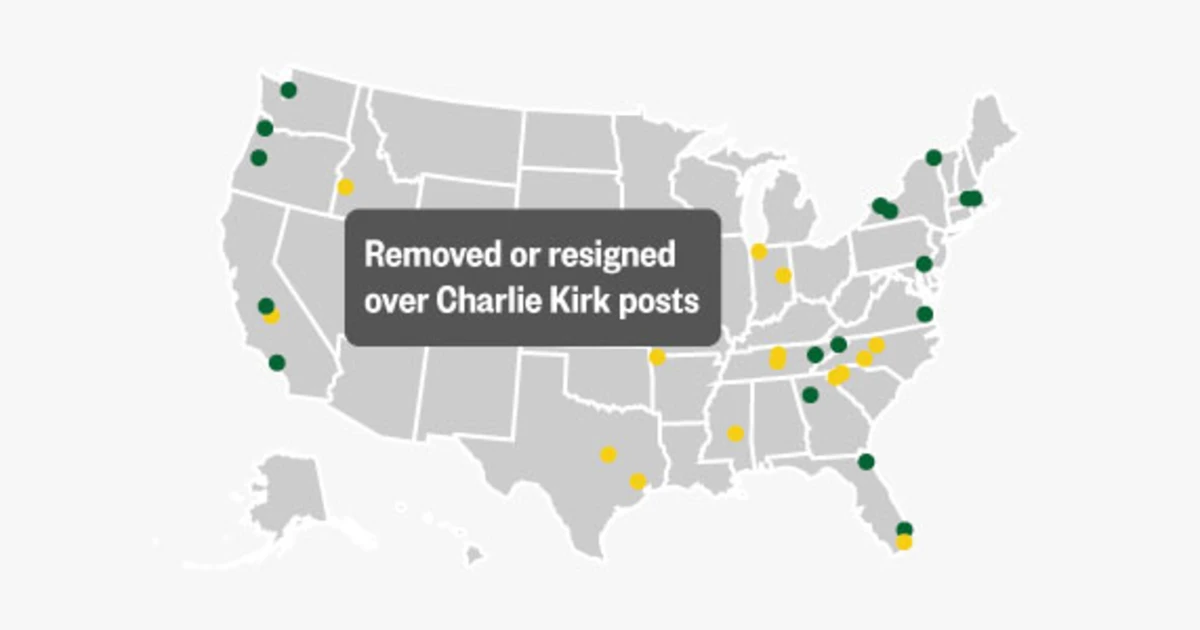
In the week since Charlie Kirk was assassinated, MAGA influencers and GOP lawmakers have pushed for swift consequences against anyone who makes light of his killing — and professors, teachers and school staff members have come under particular scrutiny.
At Clemson University, that scrutiny fell on three staff members who are alleged to have posted disparaging comments about Kirk on social media. One post called on people to “be a Tyler Robinson,” who is charged with murdering Kirk; another included a reshared statement that “karma is sometimes swift and ironic.” Clemson College Republicans circulated the screenshots, and state lawmakers soon called for the staffers’ ousters, backed by South Carolina’s attorney general and even President Donald Trump.
Within days, all three staff members had been fired. None responded to requests for comment.
“We’re not saying jail them,” state Rep. Jordan Pace, chair of the South Carolina House Freedom Caucus and one of several state lawmakers who demanded their firings, told NBC News. “We’re just saying they shouldn’t teach children. They shouldn’t teach young people on the taxpayer dime.”
In a statement acknowledging the firings, Clemson said it “remains resolute in its commitment to cultivating an environment that is safe, respectful and conducive to academic excellence.” It didn’t respond to additional questions.
The Clemson firings are part of a surging movement. At least three dozen teachers, professors and school staff members have left or been removed from their jobs because of allegations they posted inappropriate comments about Kirk, according to an NBC News review of school district and college announcements. The posts themselves ranged from political criticisms to expressions of glee over his death.
Employees in other sectors face retribution, as well. Vice President JD Vance encouraged people to report those who celebrate Kirk’s death to their employers, and Attorney General Pam Bondi vowed to “target” hate speech, though she later said she was referring specifically to threats of violence. Critics have pointed out that the Republicans, whose party has vociferously opposed “cancel culture,” are now canceling people.
The firings raise questions about what public employees should be allowed to post, particularly in light of Kirk’s own statements defending free speech. “Hate speech does not exist legally in America,” he posted on X last year. “There’s ugly speech. There’s gross speech. There’s evil speech. And ALL of it is protected by the First Amendment.”
When an attorney argued on X that the First Amendment protected the “despicable” comments that Clemson staff members were accused of making, Harmeet Dhillon, the top civil rights official in the Justice Department, responded, “You are certainly entitled to your opinion. Not every a—— is entitled to a government job in an educational institution,” using the full expletive.
State education agencies in Florida, Oklahoma and Texas are all investigating reports about teachers’ comments about Kirk — more than 200 complaints in Texas alone. “We as a society, we as a state, must send a signal that celebrating the assassination of a free speech advocate is wrong in a civil society,” Texas Gov. Greg Abbott said Tuesday on X, adding that schools and college campuses are ideal places for a “course correction.”
In recent days, school employees have been accused of — and in some cases have admitted to — posting mocking remarks. A Washington principal apologized and went on leave after he posted on Instagram, “Too bad gun control would have been far far more effective (he’d still be alive),” an apparent nod to Kirk’s strong defense of the Second Amendment. “Maybe thoughts and prayers will work…oops — nope.” He declined to comment.
UCLA placed an employee on leave pending an investigation following allegations that he posted on Bluesky, “Why shouldn’t he be dead?” and “I’m always glad when bigots die, so.” Reached for comment, the employee, Johnathan Perkins, a race and equity official, acknowledged having written the posts but said his account, which has since been deleted, made it clear that the statements weren’t intended to reflect his employer’s views. He said he had “received countless death threats” since he posted them.
Some teachers unions and First Amendment advocates, however uncomfortable with the comments, defended the educators’ right to make them. The investigations of teachers are a page out of the “authoritarian playbook,” meant to silence dissent, the Texas branch of the American Federation of Teachers said in a statement.
A staff member with PEN America, a nonprofit free speech organization, said the firings on campuses are “creating a culture of fear across society at large.”
Jonathan Friedman, managing director of the organization’s U.S. free expression programs, said that while some teachers are saying morally repugnant things, it is dangerous to have politicians weighing in on whether or not a teacher stays employed.
“We’re talking about government officials using the machinery of their offices, the power of the state, to threaten their very livelihoods,” Friedman said. “The word we have for that in the United States is ‘McCarthyism.’”
The right’s focus on educators isn’t a new phenomenon. For years, conservative groups and influencers have accused professors and administrators of using their positions to indoctrinate students with progressive ideology. In the past, some of those accusations have been linked to bomb threats against schools where the educators work.
Conservatives dispute the notion that calling out comments glorifying Kirk’s death is a form of cancel culture, particularly when taxpayer-funded employees make them.
“We’ve got teachers celebrating an assassination in the United States of America,” said Tina Descovich, a co-founder of the conservative activist group Moms for Liberty. “It is the right and the responsibility, I would say, of the state or the school district to make sure people with that moral compass are not taking care of our children during the day.”
Yet the rush to judgment can lead to mistakes. A school district in Elkhorn, Wisconsin, faced a barrage of harassment — over 900 voicemails and 1,000 emails, some including death threats within four days, it said — because of a false accusation an administrator posted: “Charlie Kirk deserves everything he got.”
Ryan Fournier, a conservative activist and co-founder of Students for Trump, circulated a screenshot last week of comments by “Cynthia Irene” and said it came from Cynthia Rehberg, an elementary school associate principal. The district said its technology staff and an outside investigator reviewed Rehberg’s accounts and confirmed she had no connection.
Fournier later deleted the post and clarified on Sunday that he named the wrong person. Contacted by NBC News, he sent a link to his post but didn’t reply to additional questions. On Sunday, he also celebrated reaching 1 million followers on Facebook.
In an interview, Rehberg said she felt helpless as the district tried to correct the record. “It’s kind of sad that we are quick to assume and judge and maybe not think critically or look closer and see is this truly what I should be sharing,” she said. “I mean, it went from very little to a lot in no time. I just was sick about how quickly that false accusation was spreading about me.”
Private organizations have broad discretion under the law to terminate employees for what they say outside of work, but public entities — including school districts and state colleges — typically have a higher bar to clear. For a public employer to fire someone for speech made outside of the scope of official duties about a “matter of public concern,” according to Supreme Court precedent, the comments also have to create a significant disruption to the government agency’s mission.
When there is a massive outcry over a teacher’s or a professor’s comments, said Nadine Strossen, former president of the American Civil Liberties Union, it gives schools more leeway to assert that they need to remove the employee.
Strossen is worried about where it will lead but not entirely surprised by what has happened thus far. “Most people believe in freedom of speech for me, but not for thee,” she said. “They care much more about a particular constitutional right if it is something that protects people that they agree with.”



